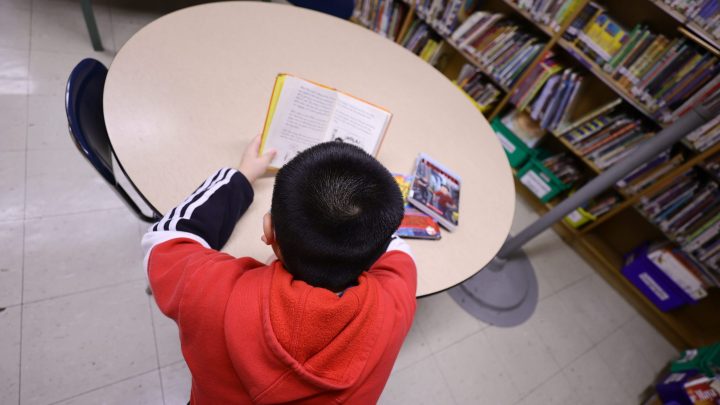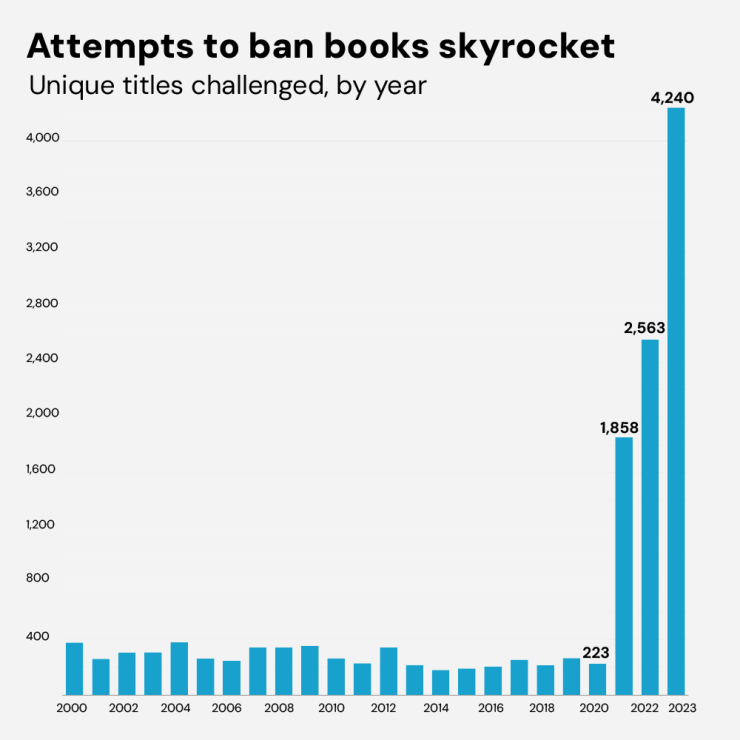
The costs of banning books

This week, we’re watching “The ABCs of Book Banning” and looking into the economic impact of book bans for schools and blacklisted authors. Marketplace’s Samantha Fields reported on the topic last year. “The ABCs of Book Banning” is available to stream on Paramount+ with a subscription.
Precedent hasn’t stopped book bans. The Supreme Court ruled in 1982 that public school officials couldn’t remove books from school libraries just because they didn’t agree with the ideas in them. Kids, the justices affirmed, had some First Amendment rights too, including at school. Even so, several states have passed laws to restrict students’ access to books about sex, gender and sexual identity, and race, among other topics at issue.
In fact, book bans have nearly doubled in recent years. The American Library Association’s Office for Intellectual Freedom released data last week showing that the number of challenges — attempted book bans — rose to 4,240 unique titles in 2023, compared to 2,563 in 2022. While a majority of these challenges occurred in Texas and Florida, another 15 states attempted to censor 100 book titles or more. Only Delaware and Vermont went the entire year with zero challenges.
Parents and politicians often debate would-be bans — the argument they make often depends on what they believe about parental rights superseding their kids’ individual rights. Less heard in these debates are kids who want to read and the authors of banned books themselves. The 2024 Oscar-nominated film “The ABCs of Book Banning” is this week’s featured short documentary.

Removing controversial texts from schools may be first and foremost a social matter, but many authors say bans have economic consequences, impacting their ability to make a living.
“As far as I know, all 14 of my young adult novels have been banned somewhere,” author Ellen Hopkins told Marketplace last year.
Because of those bans, Hopkins said she has received a lot of press attention and seen a recent spike in sales. But in years past, when her books were banned and there was less media interest, sales dried up and her royalty checks shrunk.
“School libraries are a big part of our market,” she said. “So, when they’re not allowed to repurchase them, then of course it’s going to affect book sales.”
The reality is, most authors whose books are banned don’t get much media attention — especially now that so many are being targeted. While some books facing bans are bestsellers, “others are books that are less well known,” said Kasey Meehan, program director of Freedom to Read at PEN America. “And it can be quite detrimental to the economics of that book, to be banned in that way.”
Many banned authors who write books for kids and young adults have also seen invitations to speak at schools dry up too.
“Paid school visits were a very large part of my income, maybe a quarter to a third of my annual income,” said Mike Curato, an author and illustrator.
Not anymore, now that his young adult graphic novel, “Flamer,” which is about a boy who’s dealing with bullying and racism and coming to terms with his sexual identity, was banned. Two other books he illustrated have also been banned in a bunch of schools.
“I have not been getting the invitations that I used to get,” he said. “I get a few here and there, but it’s nothing like the income that I used to rely on.”
He’s heard from many fellow authors of banned books who are experiencing the same thing.
“I’ve lost so much time because of all of this,” he said. “I have a book due at the end of the year, and I’m behind. I’m behind because I’ve dealt with so much book banning stuff. And, you know, I want to be an advocate, I want to help where I can, but all of that costs me.”
It’s work that’s important to him and to many authors facing book bans. But it can be consuming, and it’s generally unpaid. And when you’re not a superfamous author, Curato said, you have to hustle constantly to make a living.
Proposed bans cost schools too, as school boards must pay staffers to review controversial texts and determine whether there’s a legitimate reason to ban or restrict them. Librarians must also devote time to removing banned materials from their stacks.

Every Library, an advocacy group that supports libraries nationwide, estimated that implementing Texas’ recent extensive book bans — the state saw 1,470 titles challenged in 2023 — would cost its taxpayers at least $3.6 million. In Florida, school districts are spending between $34,000 and $135,000 per year to comply with a 2023 state law that requires them to review all challenged books — 2,672 titles last year — for sexually explicit content.
But Sunshine State lawmakers also proposed legislation in January to make it more costly for outsiders to challenge books en masse. The provision would allow Florida school districts to charge $100 per title for book bans submitted by people who don’t have children attending schools in the district. The majority of book bans across the U.S. have been filed by just 11 people, including two prolific challengers in Florida, Bruce Friedman and Vicki Baggett.
Next week
Our final featured short doc for March will be “Nǎi Nai & Wài Pó,” available to stream on Disney+, with a subscription. We’ll explore the economic costs of loneliness while aging in place.
There’s a lot happening in the world. Through it all, Marketplace is here for you.
You rely on Marketplace to break down the world’s events and tell you how it affects you in a fact-based, approachable way. We rely on your financial support to keep making that possible.
Your donation today powers the independent journalism that you rely on. For just $5/month, you can help sustain Marketplace so we can keep reporting on the things that matter to you.


















